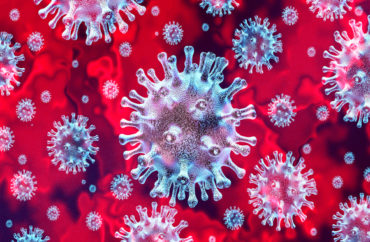
‘The patch goes on like a Band-Aid’
They had already studied previous coronavirus outbreaks when SARS-CoV-2 struck in recent months, and now they’ve rushed a potential vaccine into testing.
University of Pittsburgh School of Medicine researchers published their findings Wednesday in the open-access medical journal EBioMedicine, part of British journal The Lancet, following “critique” (peer review) from scientists at other institutions, the university said Thursday.
The paper lays out the delivery of SARS-CoV-2 vaccines via “novel microneedle array,” a method that “induced potent and long-lasting antigen-specific immune responses” against previous outbreaks, it says:
Notably, MNA delivery of these vaccines generated significantly stronger immune responses than those administered by traditional subcutaneous needle injection, indicating the improved immunogenicity by skin-targeted delivery. These efforts with MNA MERS-S1 subunit vaccines enabled the rapid design and production of MNA SARS-CoV-2 vaccines, capable of eliciting potent virus-specific antibody responses that were evident as early as 2 weeks after immunization. …
Thus far, our studies suggest that it may now be possible to produce clinical grade vaccines against novel pathogens for human testing and subsequent global distribution in time to significantly impact the spread of disease.
In layman’s terms, the coronavirus that causes COVID-19 uses the same “spike protein” at issue in the SARS outbreak of 2003 and MERS outbreak in 2014, said Andrea Gambotto, associate professor of surgery and co-senior author of the paper, in Pitt’s press release.
MORE: An econ student/health administrator breaks down coronavirus hysteria
The researchers previously tested the MERS vaccine in mice, finding that it generated a “sufficient level of antibodies to neutralize the virus for at least a year.” The “PittCoVacc” developed against SARS-CoV-2 has done the same in the first two weeks.
In a passage that may trigger pundits and public health apocalypticists, the release compares the possible treatment to a flu shot:
Compared to the experimental mRNA vaccine candidate that just entered clinical trials, the vaccine described in this paper … follows a more established approach, using lab-made pieces of viral protein to build immunity. It’s the same way the current flu shots work.
The researchers also used a novel approach to deliver the drug, called a microneedle array, to increase potency. This array is a fingertip-sized patch of 400 tiny needles that delivers the spike protein pieces into the skin, where the immune reaction is strongest. The patch goes on like a Band-Aid and then the needles—which are made entirely of sugar and the protein pieces—simply dissolve into the skin.
They are seeking “investigational new drug approval” from the FDA now. While testing in humans “would typically require at least a year and probably longer,” said co-senior author and Dermatology Department Chair Louis Falo, the new regulatory “revisions to the normal processes suggest we may be able to advance this faster.”
For people who balk at even getting a flu shot, Falo emphasizes that the process is “pretty painless—it feels kind of like Velcro.”
Read the release and published paper.
h/t The Pitt News
MORE: Stanford epidemiologist warns coronavirus crackdown based on bad data
MORE: Canadian public health prof echoes Trump’s ‘Back to Work’ plan
MORE: Mass coronavirus testing is cheaper and better than lockdown
IMAGE: Lightspring/Shutterstock
Like The College Fix on Facebook / Follow us on Twitter





Please join the conversation about our stories on Facebook, Twitter, Instagram, Reddit, MeWe, Rumble, Gab, Minds and Gettr.